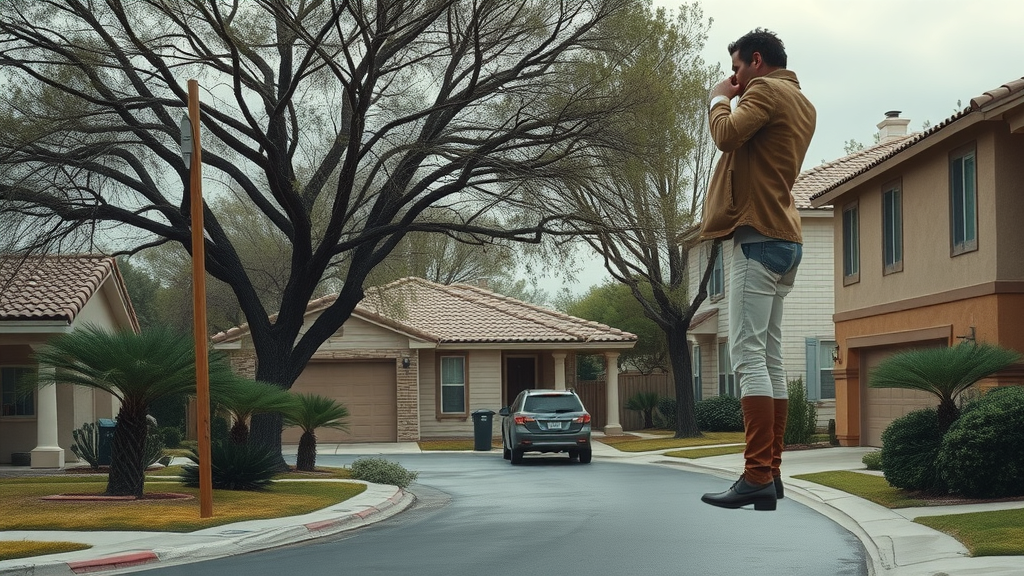- Did you know? The median Las Vegas home price has increased by over 50% in just four years, outpacing most major U.S. cities. In this opinion-driven deep dive, discover why the Las Vegas real estate market is both exciting and unpredictable in 2024.
- What you’ll discover:
- The latest Las Vegas real estate market trends
- Where investment opportunities are shifting
- Unique insights into neighborhoods in Las Vegas
- The risks & rewards for homebuyers and investors
The Las Vegas Real Estate Market Today: Surging Home Prices and Unmet Demand
The Las Vegas real estate market is making headlines for all the right—and sometimes perplexing—reasons. Fueled by economic rebound and a flood of new residents, home prices in Las Vegas have soared more than 50% since 2020. That’s a pace few metro areas can match, even as national home price growth moderates. The latest data shows a median home price nearing $450,000, underscoring just how hot Vegas housing has become. But soaring demand hasn't been met with ample supply. Even with new construction, many analysts point to “unmet demand” as the engine behind bidding wars and swift sales. For every home in Las Vegas put up for sale, there seem to be several buyers, each hoping to win the offer—especially for newly built and single-family properties.
The rapid appreciation has pushed the typical price per square foot to historic highs. Compare that to just a year ago, when inventory was roughly 30% higher, and it becomes clear why analysts are watching Vegas real estate so closely. Despite whispers of an eventual slowdown, the local housing market continues to outperform most U.S. cities by several key metrics, from fewer average days on market to a robust rental sector drawing investor interest. If you’re considering a move to Las Vegas , or just want to keep an eye on where the market’s heading next, you’ll want to track these price, demand, and inventory trends closely.

"Las Vegas housing isn’t just a local story—it’s a headline for the nation. The Las Vegas real estate market’s rapid climb is a testament to both boom and uncertainty."
Key Las Vegas Housing Market Data versus National Averages
| Metric | Las Vegas | U.S. Metro Average |
|---|---|---|
| Median Home Price | $450,000 | $390,000 |
| Average Inventory (Active Listings) | 5,000 | 8,500 |
| Average Days on Market | 22 | 35 |
| Sales Volume Change (Y/Y) | +7% | +2% |
What’s Fueling the Las Vegas Real Estate Market Surge?
- Migration from Out-of-State Buyers: With many Californians and East Coast residents seeking affordability, population inflows drive housing demand beyond historic levels.
- Entertainment Sector Rebound: As the “entertainment capital” recovers, job growth supports both rental and homebuyer activity, keeping the vegas real estate market vibrant.
- Limited Inventory Amid High Demand: Like clockwork, builders can’t keep up with buyers, creating a race for inventory that pushes up prices and tightens the market further.
- Investment and Rental Market Activity: Robust rental yields continue to attract investors, especially as inflation and rate hikes make cash flow a priority.
The housing market in Las Vegas is a magnet for those looking for better quality of life, warmer weather, and more value for their dollar. But there’s more than just residential interest. As remote work becomes normalized, professionals are seeking out the greater Las Vegas area as their new headquarters, driving up demand for homes for sale across a spectrum of price points. Combine this with a significant entertainment sector rebound—think concerts, conventions, and sporting events—and it's no wonder why builders and agents can hardly keep up. The ongoing mismatch between new listings and eager buyers keeps vegas housing red-hot well into 2024.
"For every home in Las Vegas listed for sale, three buyers are lined up – a sign of how fierce competition has become."
Investors are equally bullish. Rental markets continue to perform, and flipping activity has picked up thanks to a wave of out-of-state money. While this energy makes the short-term outlook electrifying, it also brings questions about how much longer this pace can be sustained. The push-and-pull between supply limitations and strong demand is at the very heart of the Las Vegas real estate market surge.
Hot Neighborhoods in Las Vegas: Where Buyers Are Flocking

- Summerlin: Recognized nationally for its master-planned communities, parks, and top-rated schools. Summerlin's rising home prices are a direct result of relentless demand from relocating families and empty nesters alike.
- Henderson: Prized for its safety, amenities, and suburban lifestyle, Greater Henderson is increasingly top-of-mind for buyers seeking newer homes and an active community spirit.
- Downtown Las Vegas: No longer just for tourists—revitalized neighborhoods offer chic condos, historic homes, and vibrant nightlife, making it one of the hottest urban living destinations.
- Southern Highlands: Luxurious estates, gated enclaves, and spectacular golf courses draw both traditional buyers and investors looking for high-end rental opportunities in the vegas housing market.
Each of these neighborhoods in las vegas is experiencing a unique surge in interest. Summerlin and Henderson are especially popular with families migrating from higher-cost states, attracted by their balance of amenities and outdoor space. Downtown, meanwhile, has seen a renaissance, with new residential towers and revitalized historic districts luring millennials and first-time buyers who crave walkability and urban excitement. Southern Highlands, with its luxury bends and top-rated golf, proves attractive for established professionals and retirees alike.
The popularity of these neighborhoods in las vegas is more than a passing trend—it’s driving local competition and fueling ever-higher price appreciation. Whether you’re relocating for a new job or investing for the future, these areas remain the focal points of the greater las vegas real estate market surge.
Neighborhoods in Las Vegas with Rising Home Prices
| Neighborhood | Median Home Price (2023) | Median Home Price (2024) | % Change |
|---|---|---|---|
| Summerlin | $525,000 | $570,000 | +8.6% |
| Henderson | $455,000 | $498,000 | +9.5% |
| Downtown Las Vegas | $350,000 | $392,000 | +12.0% |
| Southern Highlands | $610,000 | $655,000 | +7.4% |
| Centennial Hills | $410,000 | $441,000 | +7.6% |
Las Vegas Real Estate Market: The Investor’s Perspective

- Rental Yields: Investors flock to Las Vegas for above-average rental returns. Median rental yields sit near 7%, outpacing most U.S. cities—especially in high-demand neighborhoods in las vegas like Downtown and Henderson.
- Flipping Opportunities: While competition is stiff, rapid appreciation and strong demand create enticing conditions for flippers, particularly for single-family properties and well-located condos.
- Investment Risks: With reward comes risk; seasoned investors keep a close eye on price-to-income ratios and economic indicators to avoid being caught by sudden market corrections.
The vegas real estate market has become a magnet for individual and institutional investors alike. Many are drawn to the city’s diversification—from luxury vacation rentals in the Strip corridor to long-term leases in family-friendly suburbs. According to leading data, the average price per square foot for rental properties remains attractive, and bidding wars often break out for well-located units. Yet, the flipside is that margins can shrink quickly if acquisition costs keep rising or rents stagnate due to oversupply.
"Investing in the Las Vegas real estate market is not for the faint-hearted—timing and local knowledge make all the difference."
In an opinion-driven real estate market like Las Vegas, investors who do their homework and build relationships with local professionals can outpace those relying on broad national trends. It’s a vibrant, sometimes volatile environment that rewards boldness and a data-driven approach.
The Market’s Risks: Is the Las Vegas Housing Market Overvalued?
- The Las Vegas price-to-income ratio has climbed—faster than national averages—raising the risk of affordability crunches if wage growth stalls.
- Foreclosure rates and loan defaults are up slightly, although still well below crisis levels. It’s a warning sign that affordability and lending standards bear watching.
- When compared to its previous years and cyclical history, Vegas housing tends to run hot and cool rapidly—so a measured approach is advised.
Market overvaluation is a frequent topic among experts. Now, median home prices in some neighborhoods in las vegas require incomes at or above the 80th percentile to afford with traditional lending. Foreclosures are ticking up due to job shifts and rate resets, but remain low thanks to strong equity positions. Still, some predict a correction if interest rates climb further or if inventory levels rise quickly, as happened in cycles over the previous years.
While vegas housing is not as frothy as some coastal cities, the heat is unmistakable. Market history suggests that corrections do happen—and keeping track of national and local economic signals is not just prudent but essential for all real estate participants.
Homes for Sale in Las Vegas: Buyer Preferences and What’s Selling Fast

- Single-Family Homes: Consistently the most sought-after category, especially in greater las vegas neighborhoods where schools and amenities are top-notch.
- Condos and Townhomes: Increasingly popular with first-time buyers and investors seeking more affordable entry points to the real estate market.
- Luxury Properties & Newly Built Homes: Demand for high-end and new construction remains robust, driven by out-of-state money and local upsizing.
Homes for sale in Las Vegas that emphasize space, modern amenities, and proximity to top neighborhoods don’t stay listed for long. The tight inventory means that well-priced homes, especially those under $500,000, draw multiple offers within days. Increased demand for energy-efficient and smart home features is also influencing design and renovation choices, as buyers seek lasting value in a competitive environment.
New construction continues to shape the market, but resale inventory is where much of the action is. With luxury homes commanding record premiums and new communities popping up in places like Southwest Las Vegas and Skye Canyon, buyer preferences are more sophisticated and strategic than ever. This is fueling higher price per square foot figures, even as some buyers opt to wait for more choices and less competitive times.
Current Buyer and Seller Trends in the Las Vegas Real Estate Market
| Metric | Q1 2024 | Change (YoY) |
|---|---|---|
| Median Days on Market | 22 | -7 Days |
| Percent of Homes Sold Over Asking | 41% | +6% |
| Inventory Supply | 2.1 Months | -0.4 Months |
Future of the Las Vegas Real Estate Market: A Booming or Cooling Horizon?
- Climate Events: Water scarcity and climate resilience are growing considerations for long-term value.
- Political & Economic Shifts: Upcoming elections, interest rate trends, and federal housing policies could all impact buyer confidence and investor returns.
- 5-Year Outlook: Most analysts see steady, moderated growth, avoiding the bubbles and crashes that characterized some previous vegas housing cycles.
As Las Vegas continues to redefine its economy and culture, the real estate market remains in flux—yet filled with promise. The outlook for the next half-decade is positive but more balanced, with local leaders and builders focused on addressing inventory gaps and affordability. If you’re planning to buy, sell, or invest, staying dynamic and informed will be your strongest asset.

People Also Ask: How Overvalued Is the Las Vegas Housing Market?
- Las Vegas home prices have outpaced wage growth, and some indices rank the area among the top overvalued U.S. housing markets. However, demand and low inventory have kept prices from dropping significantly (so far).
The Las Vegas housing market is indeed priced ahead of local earnings growth, putting pressure on buyers and impacting long-term affordability. Yet, strong demand, limited new listings, and a robust job market help keep prices steady even as some investors warn of overvaluation risk. As always, success depends on entering the market with clear goals and a readiness to adapt to evolving conditions.
Are Houses Selling Fast in Las Vegas?
- Houses in the Las Vegas real estate market often receive multiple offers, and the typical home spends fewer days on the market than the national average—especially under $500,000.
The median home in Las Vegas spends just over three weeks on the market—far swifter than most U.S. metros. Properties priced below the median, particularly those in hot neighborhoods, may see contracts in as little as a week. If you're a seller aiming to capitalize on rapid turnover, this climate makes for a compelling argument to act sooner than later.
What Is the Future of Las Vegas?
- While Las Vegas continues to attract job growth and new residents, the sustainability of rapid appreciation will depend on broader economic and policy factors. The potential for a steady, moderated growth path is high.
Las Vegas seems poised to maintain its magnetism as long as job growth, quality of life, and climate adaptation efforts persist. The consensus? Expect price appreciation to slow but remain positive—a healthy middle ground for current owners, prospective buyers, and savvy investors.
Are Foreclosures Up in Las Vegas?

- Foreclosure rates in the Las Vegas housing market have ticked up, but remain well below crisis levels. A close eye on economic volatility is warranted.
Slight increases in foreclosure activity reflect broader economic headwinds and shifts in lending standards. Still, they remain a fraction of the numbers seen during the Great Recession, helped by strong equity and responsible lending over the past decade. For owners and investors alike, periodic monitoring of default rates should remain part of their risk assessment strategy.
FAQs About the Las Vegas Real Estate Market
- Is it a good time to buy a home in Las Vegas? For many, it’s still advantageous—especially if you plan to stay long-term. With prices holding and interest rates stabilizing, value can be found by those who act quickly and work with knowledgeable local agents.
- What is the average down payment for homes for sale in Las Vegas? The typical down payment is around 10–20%, although some first-time buyer programs allow for as little as 3–5%, depending on credit and loan type.
- How does the Las Vegas housing inventory compare to 2023? Inventory remains low, down about 15% from the previous year, driving more competition among buyers and often higher prices, particularly for mid-range homes.
- What are the hottest zip codes for Vegas real estate? Summerlin (89138, 89135), Henderson (89052, 89044), and Southwest Las Vegas (89141, 89178) are among the most competitive and fastest appreciating in 2024.
Las Vegas Real Estate Market at a Glance
| Category | Stat |
|---|---|
| Median Price (All Homes) | $450,000 |
| Median Price Per Square Foot | $290 |
| Average Inventory (Listings) | 5,000 |
| Average Days on Market | 22 |
| Rental Yield | 6.8% |
| Top Neighborhoods | Summerlin, Henderson, Downtown, Southern Highlands |
| One-Year Appreciation | +8.2% |
| Historic 5-Year Appreciation | +53% |
Where Does the Las Vegas Real Estate Market Head Next? My Take
"Las Vegas housing has a rhythm all its own. While the pace may cool, the city’s growth story is far from over for smart buyers and sellers who stay informed."
- If you’ve been watching the Las Vegas real estate market, now’s the time to align with a local expert and make your move before the next wave of opportunity (or risk).
Action Step: Engage a local real estate professional, define your priorities, and watch for micro-trends in neighborhoods and buyer demand. Get in now, and you could ride the next trend, not chase it.
Sources
- https://www.lv-realtor.com/statistics – Las Vegas Association of Realtors
- https://fred.stlouisfed.org/series/ATNHPIUS29820Q – Federal Reserve Bank of St. Louis
- https://www.zillow.com/las-vegas-nv/home-values – Zillow Research
- https://www.redfin.com/city/10201/NV/Las-Vegas/housing-market – Redfin Data Center
- https://www.corelogic.com/intelligence/ – CoreLogic Housing Market Insights
- https://www.census.gov/data.html – U.S. Census Bureau
- https://lasvegasnevada.gov/Residents/Housing – City of Las Vegas Housing
The Las Vegas real estate market has experienced significant changes in recent years, with notable trends in home prices, inventory levels, and buyer behavior. For instance, the median sale price of a home in Las Vegas was $440,000 in February 2025, reflecting a 1.9% increase from the previous year. ( redfin.com ) Additionally, the median listing home price in January 2025 was $459,900, up 3.3% year-over-year. ( realtor.com )
To gain a deeper understanding of these developments, consider exploring the following resources:
-
Las Vegas Housing Market: House Prices & Trends | Redfin provides comprehensive data on current home prices, inventory levels, and market competitiveness, offering valuable insights for both buyers and sellers.
-
Las Vegas, NV 2025 Housing Market | realtor.com® offers detailed information on median listing prices, days on market, and neighborhood-specific trends, helping you make informed decisions in the Las Vegas real estate landscape.
If you’re serious about navigating the Las Vegas real estate market, these resources will provide you with the essential data and analysis needed to make informed decisions.
 Add Row
Add Row  Add
Add 



Write A Comment